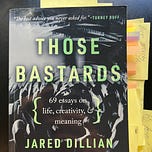Hello everyone,
I had the pleasure of chatting with Jared Dillian, author of The Daily Dirtnap and We're Gonna Get Those Bastards, about his new book Those Bastards. Years ago, I read his book Street Freak and I fondly remembered his wit, candor, depth of introspection, and keen eye for the antics of markets.
Those Bastards is a collection of Jared’s essays on life, death, meaning, friendship, marriage, luck, ambition, suicide, and much in between (including a few great bits on markets and finance). It’s refreshingly honest and fun and led to a lot of reflection. For a taste of Jared’s writing check out his excellent recent essay People Don't Change:
People don’t change, until they do. What has to happen is that person has to hit bottom. Bottoms vary for different people—people with a high bottom get to keep their jobs and spouses. People with a low bottom have to lose everything before they learn.
In our conversation we touched on writing and finding your voice, escaping the caterpillar pillar, how markets are ruled by fear, being the guy who knows a guy, mental health and the power of writing, making meaningful memories, the right temperament for markets, why people don’t change, and why you should ask people if they are lucky.
Enjoy,
Frederik
You can listen to our conversation on Spotify, Apple, anchor (and via RSS).
A few highlights from the conversation:
A lot of people think that markets sort of oscillate between fear and greed, right? But it really isn't fear and greed. It's fear and fear. It's all fear, right? Greed is fear of not getting something that you want. So working in the markets is, if you have any background in psychology, it's a very depressing place because the markets are filled with fearful people, like acting based on fear.
But the thing is that it's very predictable. People behave in very predictable ways. So that's been my thesis about markets all along.
I like to know lots and lots of people. Now, having a newsletter has been the perfect way to do that because a lot of times if I have a question about like air conditioning, I can put it in my newsletter and I get 20 responses. I know somebody who owns an HVAC company. I know people in all different kinds of industries and if I ever need help, I can reach out to them. I like to call that having a big world. I like to have a big world. I like to know lots of people. That's just my personal philosophy.
I learned that people had similar experiences, they just would never talk about it. There are things you cannot talk about in polite conversation, but you can do it with words, you can do it on the page and you can bring people into this world. And that's the magic of it. My Substack is like a safe space for people to read this stuff and think about these issues, really the only place you can talk about 'em is with a therapist or something like that.
The ‘top five memories’ piece came from the show Lost. There's a character named Charlie and he has a premonition that he's going to die. He knows exactly when it's going to happen. And so he sits down and he starts thinking of his top five memories of all time.
And it got me thinking like, that's actually a really good exercise. Like what are your top five memories of all time? I think one of mine was marching band in high school. One of mine was DJing. Really your goal in life should be to make more of those top five memories and keep doing that over and over again.
I had a trade that made 15 million bucks. That was a great trade. But it doesn't make my list of top five memories, because top five memories are about relationships and achievement and things like that. Lehman was a great place to work, but ultimately that's not what we're here on earth for.
A few quotes from Those Bastards:
As a trader you must have the memory of a goldfish. You fuck something up, you clean up the mess, and move onto the next trade. There is always another trade.
This is something they teach professional athletes. It was said that Derek Jeter was the best at doing this- he did not dwell in the past. He had absolutely no memory, and was out there hacking at his next time up at the plate. We all have slumps. It's about your ability to shake it off, rub some dirt on it, and get back in the game.
If you are to be successful, pray that it happens very slowly. Peaking early isn't just true in high school--it's broadly true throughout life. You see this a lot on Wall Street. Good performance is difficult to sustain over any period of time. Early success leads to hubris which leads to mistakes.
After a few successively smaller fund launches, you end up as a CFP in Evanston, Illinois. I was 34 years old at Lehman Brothers and still a vice president. A 34-year-old VP. Many people are surprised to hear that. Well, most of the guys I worked with are now selling insurance.
I'm not a snob and I don't look down on people, but I did resent people dumber than me getting paid more for work that required less technical sophistication. But as time has gone by, I've learned ... that a bonus has practically zero correlation with performance. Once you learn that, life gets a lot easier.
Finance is depraved. The further away it gets in the rear-view mirror, the worse it looks. I like investing. I like the intellectual challenge, I like taking risk- but I am allergic to bullshit. And there is more bullshit than ever on Wall Street.
I like to say that when you work in finance, you understand how the world works. The average person sees used car prices rising, and has no idea why. The financier knows. You become conversant in politics, geopolitics, raw materials production, trade, the FDA approval process, venture capital, private equity, and many other things. In short, you become much more worldly. A kid from Staten Island can get hired on a desk and within a few years, acquire enough sophistication to carry on an intelligent conversation with most world leaders.













Share this post